Guru Nanak’s Acrostics of the 35 Alphabets of Punjabi
The founder of Sikhism -Guru Nanak lent unique meaning to the alphabet in his own inimitable style, which was God-ordained and God-gifted. How else could one formulate the meaning of each letter of the alphabet? What a beauty is this Patti Likhi revealed a group of hymns in the early pages of Guru Granth Sahib. WSN proudly presents this piece in which Bhupinder Singh from Houston takes you through this unique composition, instilling a love for the Guru’s script Gurumukhi and respect for the mother tongue Punjabi. Read, relish, enlighten and enjoy.
![The founder of Sikhism -Guru Nanak lent unique meaning to the alphabet in his own inimitable style, which was God-ordained and God-gifted. How else could one formulate the meaning of each letter of the alphabet? What a beauty is this Patti Likhi revealed a group of hymns in the early pages of Guru Granth Sahib. WSN proudly presents this piece in which Bhupinder Singh from Houston takes you through this unique composition, instilling a love for the Guru’s script Gurumukhi […]](https://www.theworldsikhnews.com/wp-content/uploads/2020/07/Fatti-360x266.jpg)
THIS BANI -THE REVEALED COMPOSITION OF “PATTI LIKHI” -is a unique lesson imparted by Guru Nanak, using the letters of the Alphabet to convey their spiritual significance. As per the Puratan Janam Sakhi -the old version of fables of Guru Nanak, when Guru Nanak was 7, his father Mehta Kalu took him to the Pandha -teacher named Gopal for his education. The Pandha wrote the 35 letters of the Alphabet on the Patti or Takhti -a wooden tablet or slate of the times. The Patti is coated with yellow clay paste and then dried in the sun. When dried, with a sharpened reed pen, the alphabets are written over it. It can be washed and recoated and used again.
The place where Guru Nanak wrote the Patti is at a walkable distance from Guru Nanak’s birthplace -Gurdwara Janam Asthan, presently in Pakistan.
One day, during school, the child Guru Nanak sat in a corner, away from the rest of the students -deeply engrossed in writing and humming while writing. The whole day passed but the child did not show his work to his teacher. The legend goes that before the end of the day, when asked to show his work, the prodigal mystic child brought 3 Pattis– slates and handed one to the Pandha, while still holding on to the remaining two.

The learned teacher Gopal was stunned to see acrostics – praises of God using all the letters of Alphabet. Gopal struck in awe asked Guru Nanak why he does not learn what his father wants him to learn. He reminded Guru Ji that he will be taking over from his father the property accounts of the village and will be managing those. Guru Nanak replied, “That knowledge will not in any way help you in obtaining liberation“. The teacher was very much astonished at the words of the young child. Pandha asked him, “Nanak, tell me something which could help me in the attainment of salvation“.
Guru Nanak gave a complete discourse which is part of Guru Granth Sahib on Page 16, but for this discussion let us restrict ourselves to Patti which is on page 432. The Pandha was very impressed as he saw in the child Nanak, making of a great personality. He recommended to the child Guru’s father that Nanak should be under the charge of Pandit Brij Nath, who can teach him Sanskrit and scriptures, as he does not have anything more to teach child Nanak.
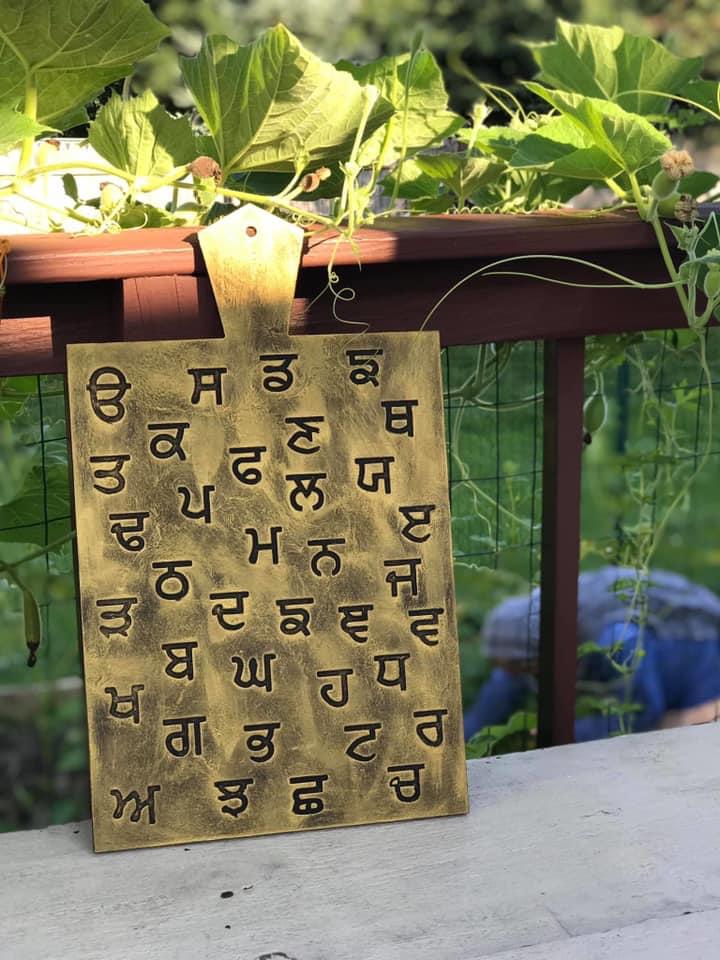
The revelation -“Patti Likhi” -letter by letter of the 35 Alphabets of Gurmukhi, is remarkable and takes one to a new level of enlightenment:
ਸ (Sassa):
ਸਸੈ ਸੋਇ ਸ੍ਰਿਸਟਿ ਜਿਨਿ ਸਾਜੀ ਸਭਨਾ ਸਾਹਿਬੁ ਏਕੁ ਭਇਆ॥
ਸੇਵਤ ਰਹੇ ਚਿਤੁ ਜਿਨ੍ਹ੍ ਕਾ ਲਾਗਾ ਆਇਆ ਤਿਨ੍ਹ੍ ਕਾ ਸਫਲੁ ਭਇਆ ॥੧॥
He, who created the world, is the One Lord and Master of all. For those, whose consciousness remains committed to His remembrance (in Service) – blessed is their birth, and their coming into the world. ||1||
ਮਨ ਕਾਹੇ ਭੂਲੇ ਮੂੜ ਮਨਾ ॥ ਜਬ ਲੇਖਾ ਦੇਵਹਿ ਬੀਰਾ ਤਉ ਪੜਿਆ ॥੧॥ ਰਹਾਉ ॥
O mind, why forget Him? You foolish mind! When you have to render your account, and balance due is cleared, O brother, only then shall you be judged wise. ||1||Pause||
ੲ (Eevree):
ਈਵੜੀ ਆਦਿ ਪੁਰਖੁ ਹੈ ਦਾਤਾ ਆਪੇ ਸਚਾ ਸੋਈ॥
ਏਨਾ ਅਖਰਾ ਮਹਿ ਜੋ ਗੁਰਮੁਖਿ ਬੂਝੈ ਤਿਸੁ ਸਿਰਿ ਲੇਖੁ ਨ ਹੋਈ॥੨॥
The Primal Lord is the Giver; He alone is eternal. There is no outstanding balance due from the Gurmukh, who understands the Lord through these letters. ||2||
ੳ (Ooraa):
ਊੜੈ ਉਪਮਾ ਤਾ ਕੀ ਕੀਜੈ ਜਾ ਕਾ ਅੰਤੁ ਨ ਪਾਇਆ॥
ਸੇਵਾ ਕਰਹਿ ਸੇਈ ਫਲੁ ਪਾਵਹਿ ਜਿਨ੍ਹ੍ਹੀ ਸਚੁ ਕਮਾਇਆ॥੩॥
Sing the Praises of the One whose limit cannot be found. They alone obtain the fruits (of achieving the purpose of life) who serve Him (by meditating) becoming truthful. ||3||
ਙ (Nganga):
ਙੰਙੈ ਙਿਆਨੁ ਬੂਝੈ ਜੇ ਕੋਈ ਪੜਿਆ ਪੰਡਿਤੁ ਸੋਈ॥
ਸਰਬ ਜੀਆ ਮਹਿ ਏਕੋ ਜਾਣੈ ਤਾ ਹਉਮੈ ਕਹੈ ਨ ਕੋਈ॥੪॥
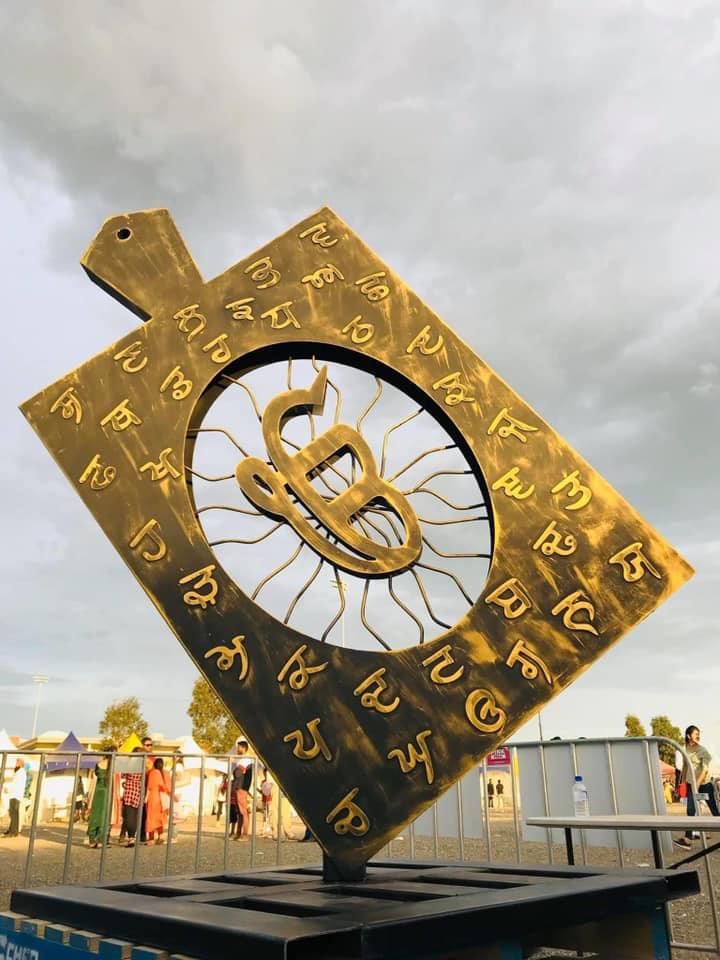
One who understands spiritual wisdom becomes a Pundit, a religious scholar. One who recognizes the One Lord among all beings does not talk in ego. ||4||
ਕ (Kakka):
ਕਕੈ ਕੇਸ ਪੁੰਡਰ ਜਬ ਹੂਏ ਵਿਣੁ ਸਾਬੂਣੈ ਉਜਲਿਆ॥
ਜਮ ਰਾਜੇ ਕੇ ਹੇਰੂ ਆਏ ਮਾਇਆ ਕੈ ਸੰਗਲਿ ਬੰਧਿ ਲਇਆ॥੫॥
When the hair grows grey, then they shine without shampoo. The hunters of the King of Death come, and bind him in the chains of worldly attachment (Maya). ||5||
ਖ (Khakha):
ਖਖੈ ਖੁੰਦਕਾਰੁ ਸਾਹ ਆਲਮੁ ਕਰਿ ਖਰੀਦਿ ਜਿਨਿ ਖਰਚੁ ਦੀਆ॥
ਬੰਧਨਿ ਜਾ ਕੈ ਸਭੁ ਜਗੁ ਬਾਧਿਆ ਅਵਰੀ ਕਾ ਨਹੀ ਹੁਕਮੁ ਪਇਆ॥੬॥
The Creator is the King of the world; He owns all of us as He is providing sustenance (of breath to live). By His Binding, the entire world is bound; no other Commands prevail. ||6||
ਗ (Gagga):
ਗਗੈ ਗੋਇ ਗਾਇ ਜਿਨਿ ਛੋਡੀ ਗਲੀ ਗੋਬਿਦੁ ਗਰਬਿ ਭਇਆ॥
ਘੜਿ ਭਾਂਡੇ ਜਿਨਿ ਆਵੀ ਸਾਜੀ ਚਾੜਣ ਵਾਹੈ ਤਈ ਕੀਆ॥੭॥
One, who renounces singing of the songs of the Lord of the Universe, becomes arrogant in his speech. One who has shaped the pots, and made the world the kiln, decides when to put them in it (and out). ||7||
ਘ (Ghagha):
ਘਘੈ ਘਾਲ ਸੇਵਕੁ ਜੇ ਘਾਲੈ ਸਬਦਿ ਗੁਰੂ ਕੈ ਲਾਗਿ ਰਹੈ॥
ਬੁਰਾ ਭਲਾ ਜੇ ਸਮ ਕਰਿ ਜਾਣੈ ਇਨ ਬਿਧਿ ਸਾਹਿਬੁ ਰਮਤੁ ਰਹੈ॥੮॥
The servant who performs service, remains attached to the Word of the Guru’s Shabad. One who recognizes bad and good as one and the same – in this way he is absorbed into the Lord and Master. ||8||
ਚ (Chacha):
ਚਚੈ ਚਾਰਿ ਵੇਦ ਜਿਨਿ ਸਾਜੇ ਚਾਰੇ ਖਾਣੀ ਚਾਰਿ ਜੁਗਾ॥
ਜੁਗੁ ਜੁਗੁ ਜੋਗੀ ਖਾਣੀ ਭੋਗੀ ਪੜਿਆ ਪੰਡਿਤੁ ਆਪਿ ਥੀਆ॥੯॥
He created the four Vedas, the four sources of creation, and the four ages – through each and every age, He Himself dwells in all as the Yogi, the house-holder, the Pundit and the scholar. ||9||
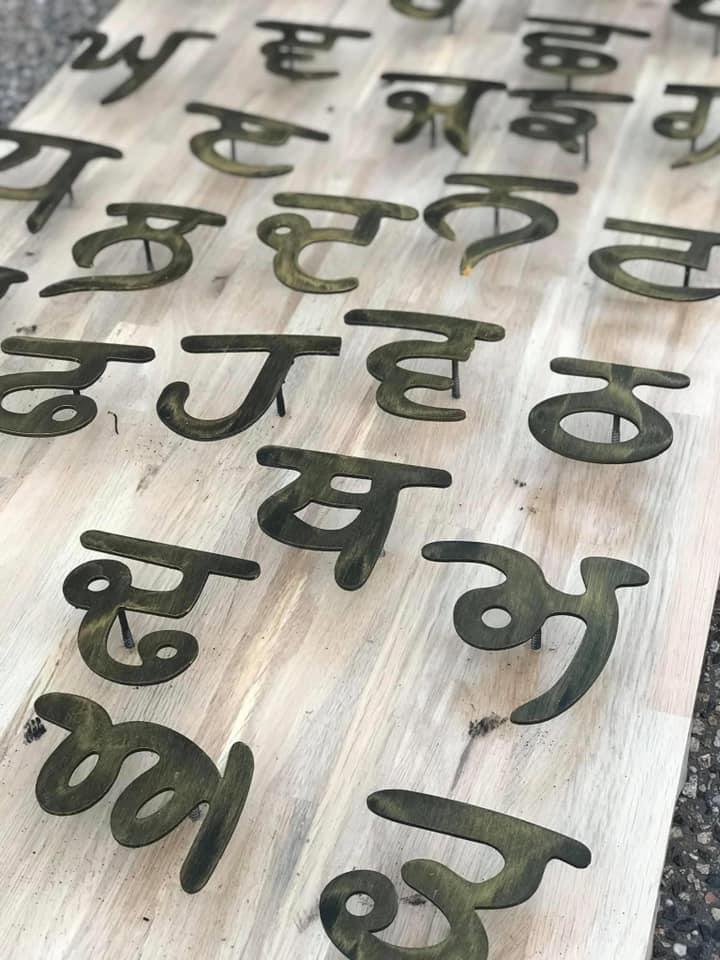
ਛ (Chhachha):
ਛਛੈ ਛਾਇਆ ਵਰਤੀ ਸਭ ਅੰਤਰਿ ਤੇਰਾ ਕੀਆ ਭਰਮੁ ਹੋਆ॥
ਭਰਮੁ ਉਪਾਇ ਭੁਲਾਈਅਨੁ ਆਪੇ ਤੇਰਾ ਕਰਮੁ ਹੋਆ ਤਿਨ੍ਹ੍ ਗੁਰੂ ਮਿਲਿਆ॥੧੦॥
Ignorance exists within everyone; doubt is Your doing, O Lord. Having created doubt, You Yourself has caused them to wander in delusion; those whom You bless with Your Mercy meet with the Guru (and their ignorance is removed). ||10||
ਜ (Jajja):
ਜਜੈ ਜਾਨੁ ਮੰਗਤ ਜਨੁ ਜਾਚੈ ਲਖ ਚਉਰਾਸੀਹ ਭੀਖ ਭਵਿਆ॥
ਏਕੋ ਲੇਵੈ ਏਕੋ ਦੇਵੈ ਅਵਰੁ ਨ ਦੂਜਾ ਮੈ ਸੁਣਿਆ॥੧੧॥
That humble being who begs for wisdom has wandered begging through 8.4 million incarnations. The One Lord takes away, and the One Lord gives; I have not heard of any other. ||11||
ਝ (Jhajha):
ਝਝੈ ਝੂਰਿ ਮਰਹੁ ਕਿਆ ਪ੍ਰਾਣੀ ਜੋ ਕਿਛੁ ਦੇਣਾ ਸੁ ਦੇ ਰਹਿਆ॥
ਦੇ ਦੇ ਵੇਖੈ ਹੁਕਮੁ ਚਲਾਏ ਜਿਉ ਜੀਆ ਕਾ ਰਿਜਕੁ ਪਇਆ॥੧੨॥
O mortal being, why are you dying of anxiety (for possessions)? Whatever the Lord is to give, He shall keep on giving. He gives, and gives, and watches over us; according to the Orders which He issues, His beings receive destined sustenance. ||12||
ਞ (Nyanya):
ਞੰਞੈ ਨਦਰਿ ਕਰੇ ਜਾ ਦੇਖਾ ਦੂਜਾ ਕੋਈ ਨਾਹੀ॥
ਏਕੋ ਰਵਿ ਰਹਿਆ ਸਭ ਥਾਈ ਏਕੁ ਵਸਿਆ ਮਨ ਮਾਹੀ॥੧੩॥
When the Lord bestows His Glance of Grace, and then I realize there is no second (who can provide). The One Lord is totally pervading everywhere; the One Lord abides within the mind. ||13||
ਟ (Ta-tta):
ਟਟੈ ਟੰਚੁ ਕਰਹੁ ਕਿਆ ਪ੍ਰਾਣੀ ਘੜੀ ਕਿ ਮੁਹਤਿ ਕਿ ਉਠਿ ਚਲਣਾ॥
ਜੂਐ ਜਨਮੁ ਨ ਹਾਰਹੁ ਅਪਣਾ ਭਾਜਿ ਪੜਹੁ ਤੁਮ ਹਰਿ ਸਰਣਾ॥੧੪॥
Why do you practice hypocrisy (consumed in worldly pursuits and exhibiting your assets), O mortal? In a moment, in an instant, you will depart from the world. Don’t lose your life in the (life’s) gamble – hurry to the Lord’s Sanctuary. ||14||
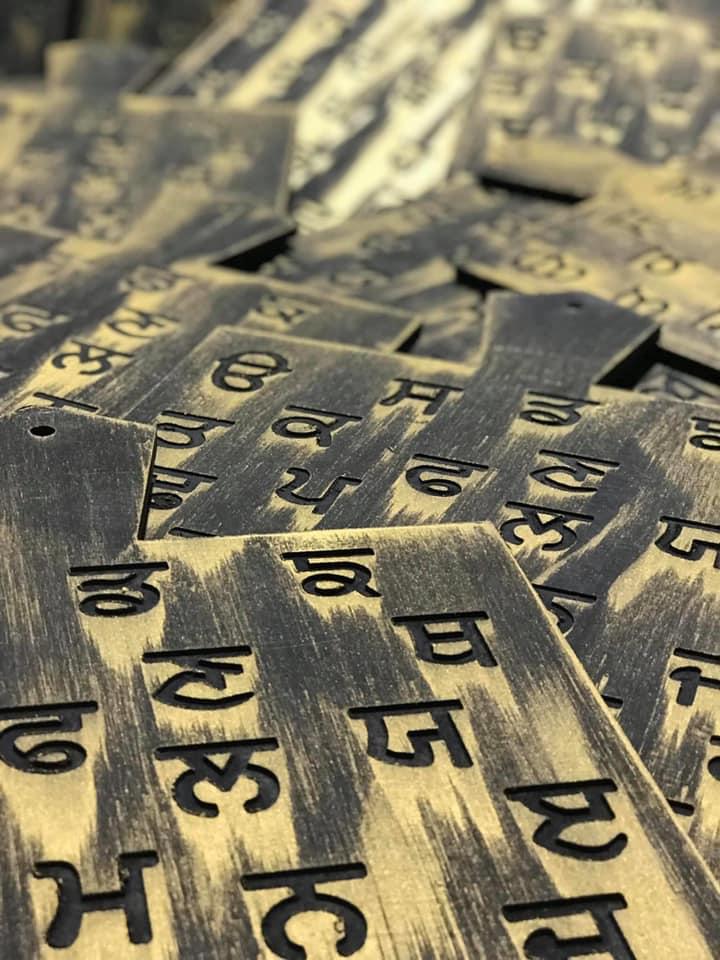
ਠ (T’hat’ha):
ਠਠੈ ਠਾਢਿ ਵਰਤੀ ਤਿਨ ਅੰਤਰਿ ਹਰਿ ਚਰਣੀ ਜਿਨ ਕਾ ਚਿਤੁ ਲਾਗਾ॥
ਚਿਤੁ ਲਾਗਾ ਸੇਈ ਜਨ ਨਿਸਤਰੇ ਤਉ ਪਰਸਾਦੀ ਸੁਖੁ ਪਾਇਆ॥੧੫॥
Peace pervades within those who link their consciousness to the Lord’s Lotus Feet. Those humble beings, whose consciousness is so attuned, are saved; by Your Grace, they obtain peace. ||15||
ਡ (Dadda):
ਡਡੈ ਡੰਫੁ ਕਰਹੁ ਕਿਆ ਪ੍ਰਾਣੀ ਜੋ ਕਿਛੁ ਹੋਆ ਸੁ ਸਭੁ ਚਲਣਾ॥
ਤਿਸੈ ਸਰੇਵਹੁ ਤਾ ਸੁਖੁ ਪਾਵਹੁ ਸਰਬ ਨਿਰੰਤਰਿ ਰਵਿ ਰਹਿਆ ॥੧੬॥
Why do you make such ostentatious shows, O mortal? All that exists (is perishable) shall all pass away. So serve Him, who is contained and pervading among everyone, and you shall attain eternal bliss. ||16||
ਢ (Dhaddha):
ਢਢੈ ਢਾਹਿ ਉਸਾਰੈ ਆਪੇ ਜਿਉ ਤਿਸੁ ਭਾਵੈ ਤਿਵੈ ਕਰੇ॥
ਕਰਿ ਕਰਿ ਵੇਖੈ ਹੁਕਮੁ ਚਲਾਏ ਤਿਸੁ ਨਿਸਤਾਰੇ ਜਾ ਕਉ ਨਦਰਿ ਕਰੇ॥੧੭॥
He Himself establishes and disestablishes; as it pleases His Will, so does He act. Having created the creation, He watches over it; He issues His Commands, and emancipates those, upon whom He casts His Glance of Grace. ||17||
ਣ (Nhaana):
ਣਾਣੈ ਰਵਤੁ ਰਹੈ ਘਟ ਅੰਤਰਿ ਹਰਿ ਗੁਣ ਗਾਵੈ ਸੋਈ॥
ਆਪੇ ਆਪਿ ਮਿਲਾਏ ਕਰਤਾ ਪੁਨਰਪਿ ਜਨਮੁ ਨ ਹੋਈ॥੧੮॥
One whose heart is filled with the Lord, sings His Glorious Praises. One, whom the Creator Lord unites with Himself, is not consigned to reincarnation. ||18||
ਤ (Tat-ta):
ਤਤੈ ਤਾਰੂ ਭਵਜਲੁ ਹੋਆ ਤਾ ਕਾ ਅੰਤੁ ਨ ਪਾਇਆ॥
ਨਾ ਤਰ ਨਾ ਤੁਲਹਾ ਹਮ ਬੂਡਸਿ ਤਾਰਿ ਲੇਹਿ ਤਾਰਣ ਰਾਇਆ॥੧੯॥
The dreadful world-ocean is so very deep; its limits beyond reach. I do not have a boat, or even a raft (of spiritual wisdom); I am drowning – save me, O Savior King! ||19||
ਥ (T’hat’ha):
ਥਥੈ ਥਾਨਿ ਥਾਨੰਤਰਿ ਸੋਈ ਜਾ ਕਾ ਕੀਆ ਸਭੁ ਹੋਆ॥
ਕਿਆ ਭਰਮੁ ਕਿਆ ਮਾਇਆ ਕਹੀਐ ਜੋ ਤਿਸੁ ਭਾਵੈ ਸੋਈ ਭਲਾ॥੨੦॥
In all places and interspaces, He is; everything which exists is by His doing. What is doubt? What is called illusion (Maya)? Whatever pleases Him is good. ||20||
ਦ (Dadda):
ਦਦੈ ਦੋਸੁ ਨ ਦੇਊ ਕਿਸੈ ਦੋਸੁ ਕਰੰਮਾ ਆਪਣਿਆ॥
ਜੋ ਮੈ ਕੀਆ ਸੋ ਮੈ ਪਾਇਆ ਦੋਸੁ ਨ ਦੀਜੈ ਅਵਰ ਜਨਾ॥੨੧॥
Do not blame anyone else; blame instead your own actions. Whatever I did, for that I have suffered; I do not blame anyone else. ||21||
ਧ (Dhadha):
ਧਧੈ ਧਾਰਿ ਕਲਾ ਜਿਨਿ ਛੋਡੀ ਹਰਿ ਚੀਜੀ ਜਿਨਿ ਰੰਗ ਕੀਆ॥
ਤਿਸ ਦਾ ਦੀਆ ਸਭਨੀ ਲੀਆ ਕਰਮੀ ਕਰਮੀ ਹੁਕਮੁ ਪਇਆ॥੨੨॥
His power established and upholds the earth; the Lord has imparted His color (beauty) to everything. His gifts are received by everyone; all pleasure and pain is as per our past deeds. ||22||
ਨ (Nan-na):
ਨੰਨੈ ਨਾਹ ਭੋਗ ਨਿਤ ਭੋਗੈ ਨਾ ਡੀਠਾ ਨਾ ਸੰਮ੍ਹਲਿਆ॥
ਗਲੀ ਹਉ ਸੋਹਾਗਣਿ ਭੈਣੇ ਕੰਤੁ ਨ ਕਬਹੂੰ ਮੈ ਮਿਲਿਆ॥੨੩॥
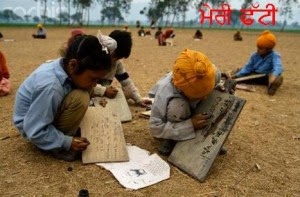
The Husband Lord enjoys eternal pleasures (through His creation), but He is not seen or understood (by me). I am namesake soul-bride, O sister, but my Husband Lord has never met me. ||23||
ਪ (Pappa):
ਪਪੈ ਪਾਤਿਸਾਹੁ ਪਰਮੇਸਰੁ ਵੇਖਣ ਕਉ ਪਰਪੰਚੁ ਕੀਆ॥
ਦੇਖੈ ਬੂਝੈ ਸਭੁ ਕਿਛੁ ਜਾਣੈ ਅੰਤਰਿ ਬਾਹਰਿ ਰਵਿ ਰਹਿਆ॥੨੪॥
The Supreme King, the Transcendent Lord, created the world, and watches over it. He witnesses and understands, and knows everything; inwardly and outwardly, he is fully pervading. ||24||
ਫ (Faffa):
ਫਫੈ ਫਾਹੀ ਸਭੁ ਜਗੁ ਫਾਸਾ ਜਮ ਕੈ ਸੰਗਲਿ ਬੰਧਿ ਲਇਆ॥
ਗੁਰ ਪਰਸਾਦੀ ਸੇ ਨਰ ਉਬਰੇ ਜਿ ਹਰਿ ਸਰਣਾਗਤਿ ਭਜਿ ਪਇਆ॥੨੫॥
The whole world is caught in the noose of Death, and all are bound by its chains by agents of death. By Guru’s Grace, they alone are saved, who seek to enter the Lord’s Sanctuary. ||25||
ਬ (Babba):
ਬਬੈ ਬਾਜੀ ਖੇਲਣ ਲਾਗਾ ਚਉਪੜਿ ਕੀਤੇ ਚਾਰਿ ਜੁਗਾ॥
ਜੀਅ ਜੰਤ ਸਭ ਸਾਰੀ ਕੀਤੇ ਪਾਸਾ ਢਾਲਣਿ ਆਪਿ ਲਗਾ॥੨੬॥
He set out to play the game, on the game dice cloth of the four ages. He made all beings and creatures his pawns, and He Himself threw the dice. ||26||
ੳ (Ooraa):
ਊੜੈ ਉਪਮਾ ਤਾ ਕੀ ਕੀਜੈ ਜਾ ਕਾ ਅੰਤੁ ਨ ਪਾਇਆ॥
ਸੇਵਾ ਕਰਹਿ ਸੇਈ ਫਲੁ ਪਾਵਹਿ ਜਿਨ੍ਹ੍ਹੀ ਸਚੁ ਕਮਾਇਆ॥੩॥
Sing the Praises of the One whose limit cannot be found. They alone obtain the fruits (of achieving the purpose of life) who serve Him (by meditating) becoming truthful. ||3||
ਭ (Bhabha):
ਭਭੈ ਭਾਲਹਿ ਸੇ ਫਲੁ ਪਾਵਹਿ ਗੁਰ ਪਰਸਾਦੀ ਜਿਨ੍ਹ੍ਹ ਕਉ ਭਉ ਪਇਆ॥
ਮਨਮੁਖ ਫਿਰਹਿ ਨ ਚੇਤਹਿ ਮੂੜੇ ਲਖ ਚਉਰਾਸੀਹ ਫੇਰੁ ਪਇਆ॥੨੭॥
Those who search find the fruits of their rewards; by Guru’s Grace, they live in the Fear of God. The self-willed manmukhs wander around, and they do not remember the Lord; the fools are consigned to the cycle of 8.4 million incarnations. ||27||
ਮ (Mamma):
ਮੰਮੈ ਮੋਹੁ ਮਰਣੁ ਮਧੁਸੂਦਨੁ ਮਰਣੁ ਭਇਆ ਤਬ ਚੇਤਵਿਆ॥
ਕਾਇਆ ਭੀਤਰਿ ਅਵਰੋ ਪੜਿਆ ਮੰਮਾ ਅਖਰੁ ਵੀਸਰਿਆ॥੨੮॥
In emotional attachment, he dies; he only thinks of the Lord, the Love of Nectar, at death time. As long as the body is alive, he keeps reading other things, and forgets the letter ‘M’, which stands for marnaa – death and Madusoodan- God. ||28||
ਯ (Yayya):
ਯਯੈ ਜਨਮੁ ਨ ਹੋਵੀ ਕਦ ਹੀ ਜੇ ਕਰਿ ਸਚੁ ਪਛਾਣੈ॥
ਗੁਰਮੁਖਿ ਆਖੈ ਗੁਰਮੁਖਿ ਬੂਝੈ ਗੁਰਮੁਖਿ ਏਕੋ ਜਾਣੈ॥੨੯॥
He would never be reincarnated again if he recognizes the True Lord. The Guru-oriented speaks, understands, and knows only the One (All pervading) Lord. ||29||
ਰ (Rarra):
ਰਾਰੈ ਰਵਿ ਰਹਿਆ ਸਭ ਅੰਤਰਿ ਜੇਤੇ ਕੀਏ ਜੰਤਾ॥
ਜੰਤ ਉਪਾਇ ਧੰਧੈ ਸਭ ਲਾਏ ਕਰਮੁ ਹੋਆ ਤਿਨ ਨਾਮੁ ਲਇਆ॥੩੦॥
The Lord is pervading among all; that He has created. Having created His beings, He has put them all to work; they alone remember the Naam, upon whom He bestows His Grace. ||30||
ਹ (Haha):
ਹਾਹੈ ਹੋਰੁ ਨ ਕੋਈ ਦਾਤਾ ਜੀਅ ਉਪਾਇ ਜਿਨਿ ਰਿਜਕੁ ਦੀਆ॥
ਹਰਿ ਨਾਮੁ ਧਿਆਵਹੁ ਹਰਿ ਨਾਮਿ ਸਮਾਵਹੁ ਅਨਦਿਨੁ ਲਾਹਾ ਹਰਿ ਨਾਮੁ ਲੀਆ॥੩੪॥
There is no other Giver than Him; having created the creatures, He gives them sustenance. Meditate on the Lord’s Name, be absorbed into the Lord’s Name, night and day, and reap the Profit of the Lord’s Name. ||34||
ਲ (Lalla):
ਲਲੈ ਲਾਇ ਧੰਧੈ ਜਿਨਿ ਛੋਡੀ ਮੀਠਾ ਮਾਇਆ ਮੋਹੁ ਕੀਆ॥
ਖਾਣਾ ਪੀਣਾ ਸਮ ਕਰਿ ਸਹਣਾ ਭਾਣੈ ਤਾ ਕੈ ਹੁਕਮੁ ਪਇਆ॥੩੧॥
He has assigned people to their tasks, and made the love of Maya (worldly attachment) seem sweet to them. We pass time by eating, drinking; endure pain and pleasure equally whatever occurs, by His Will, by His Command. ||31||
ਵ (Wawa):
ਵਵੈ ਵਾਸੁਦੇਉ ਪਰਮੇਸਰੁ ਵੇਖਣ ਕਉ ਜਿਨਿ ਵੇਸੁ ਕੀਆ॥
ਵੇਖੈ ਚਾਖੈ ਸਭੁ ਕਿਛੁ ਜਾਣੈ ਅੰਤਰਿ ਬਾਹਰਿ ਰਵਿ ਰਹਿਆ॥੩੨॥
The all-pervading Transcendent Lord beholds the world; He created the form it wears. He beholds, tastes, and knows everything; He is pervading and permeating inwardly and outwardly. ||32||
ਰ (Rarra):
ਰਾਰੈ ਰਵਿ ਰਹਿਆ ਸਭ ਅੰਤਰਿ ਜੇਤੇ ਕੀਏ ਜੰਤਾ॥
ਜੰਤ ਉਪਾਇ ਧੰਧੈ ਸਭ ਲਾਏ ਕਰਮੁ ਹੋਆ ਤਿਨ ਨਾਮੁ ਲਇਆ॥੩੦॥
The Lord is pervading among all; that He has created. Having created His beings, He has put them all to work; they alone remember the Naam, upon whom He bestows His Grace. ||30||
ੜ (Rhaara):
ੜਾੜੈ ਰਾੜਿ ਕਰਹਿ ਕਿਆ ਪ੍ਰਾਣੀ ਤਿਸਹਿ ਧਿਆਵਹੁ ਜਿ ਅਮਰੁ ਹੋਆ॥
ਤਿਸਹਿ ਧਿਆਵਹੁ ਸਚਿ ਸਮਾਵਹੁ ਓਸੁ ਵਿਟਹੁ ਕੁਰਬਾਣੁ ਕੀਆ॥੩੩॥
Why do you quarrel, O mortal? Meditate on the Imperishable Lord, and be absorbed into the True One. Become a sacrifice to Him. ||33||
ਹ (Haha):
ਹਾਹੈ ਹੋਰੁ ਨ ਕੋਈ ਦਾਤਾ ਜੀਅ ਉਪਾਇ ਜਿਨਿ ਰਿਜਕੁ ਦੀਆ॥
ਹਰਿ ਨਾਮੁ ਧਿਆਵਹੁ ਹਰਿ ਨਾਮਿ ਸਮਾਵਹੁ ਅਨਦਿਨੁ ਲਾਹਾ ਹਰਿ ਨਾਮੁ ਲੀਆ॥੩੪॥
There is no other Giver than Him; having created the creatures, He gives them sustenance. Meditate on the Lord’s Name, be absorbed into the Lord’s Name, night and day, and reap the Profit of the Lord’s Name. ||34||
ਅ (Airaa):
ਆਇੜੈ ਆਪਿ ਕਰੇ ਜਿਨਿ ਛੋਡੀ ਜੋ ਕਿਛੁ ਕਰਣਾ ਸੁ ਕਰਿ ਰਹਿਆ॥
ਕਰੇ ਕਰਾਏ ਸਭ ਕਿਛੁ ਜਾਣੈ ਨਾਨਕ ਸਾਇਰ ਇਵ ਕਹਿਆ॥੩੫॥੧॥
He Himself created the world; whatever He has to do, He continues to do. He acts, and causes others to act, and He knows everything; so says Nanak, the poet. ||35||1||
Reading this bani ‘Patti Likhi’ today makes us realize that Guru Nanak was a born poet, with true spiritual wisdom and one with God.
The universal message that flows from these alphabets is that the entire world is God’s Creation, and it runs as per His Will. We are just like pawns in the grand scheme and we should always remember Him. Guru Nanak’s core message is in the Rahao -Pause line (bold letters above) after the first stanza, where Guru Ji’s says to learn to stay on track on the purpose of life. First, start with an understanding of the world where you live. Next by understanding the purpose of life, stay focused on achieving that objective. Success is only achieved by those who stay focused and are clear about their objective. Here, Guru Nanak has addressed his mind as a brother, reminding it that it will have to render account on how the capital of breath which is life has been utilized. There it will be judged as educated only if it made the right choices.
Normally the teaching of the letters is usually by their association with common words, such as ‘A’ for apple. But these alphabet letters are unique, as they are part of a sacred language and they are the building blocks of all the teachings. The letters have transcended their realm of conveying the basic purpose as sound, transporting us in the realm of sacred sound.
Reading this bani ‘Patti Likhi’ today makes us realize that Guru Nanak was a born poet, with true spiritual wisdom and one with God.
Many people relate Gurmukhi as an invention of the second Master -Guru Angad, but this evidence of Guru Nanak Dev confirms the existence of the script much earlier.
The discerning reader may have noted that the arrangement of the alphabet is different from the standardized alphabet as we know today. Now, that is the contribution of Guru Angad in rearranging the position of letters, standardizing, and popularizing it.
Unfortunately, Sikhs are drifting away from their language -the language of their scriptures, the remarkable acrostics under the influence of other languages. In the process, we are depriving ourselves of Gurbani. Already many Hindu and Muslim Panjabis have distanced themselves from the language and the script. We who consider this as our divine heritage should not become the cause of its demise by patronizing other languages at the cost of our mother tongue.
The Fifth Master Guru Arjan salutes spiritual wisdom of Guru Nanak saying,
“ਗੁਰੁ ਨਾਨਕੁ ਜਿਨ ਸੁਣਿਆ ਪੇਖਿਆ ਸੇ ਫਿਰਿ ਗਰਭਾਸਿ ਨ ਪਰਿਆ ਰੇ ]4]2]13]”
Those who have heard, and seen Guru Nanak, do not descend into the womb of reincarnation again.
Let us all pray that may the Guru grant us his grace so we learn to listen and see our Guru.
References:
- www.Sikhitothemax.org
- www.sikhiwiki.org/index.php/Patti_Likhi
- Singh, Prof. Sahib. Sri Guru Granth Sahib Darpan. Volume 3. Raj Publishers.
- Singh, Bhai Vir. Santhiya Sri Guru Granth Sahib. Volume VI. Bhai Vir Singh Sahit Sadan.
- Singh, Bhai Vir. Sri Guru Nanak Chamatkar. Poorbarath (Volume 1). Bhai Vir Singh Sahit Sadan
- Singh, Satbir. Baliyo Chirag. Life of Guru Nanak Dev Ji. New Book Co.
- Surma, M. S., Guru Nanak Apostle of Love. B. Jawahar Singh Kirpal Singh & Co.
 An engineer by profession, hailing from Myanmar, educated in India, Bhupinder Singh is a Houston-based businessman, with a keen interest in writing books and articles on Sikh history, motivation and spirituality. The books he has written include, Connecting with the Master – A collection of essays on topics related to Sikhism, Gurmat Quotient (GQ) – Book on development of Spirituality, Rehraas – With meaning and commentary in English, Why are We Here? – Become exploring the purpose of human life, Fish Eat Fish World – An Illustrated Children’s book, Humility – A Spiritual Journey, In Bully’s Eyes – An Illustrated Children’s book on Bullying.
An engineer by profession, hailing from Myanmar, educated in India, Bhupinder Singh is a Houston-based businessman, with a keen interest in writing books and articles on Sikh history, motivation and spirituality. The books he has written include, Connecting with the Master – A collection of essays on topics related to Sikhism, Gurmat Quotient (GQ) – Book on development of Spirituality, Rehraas – With meaning and commentary in English, Why are We Here? – Become exploring the purpose of human life, Fish Eat Fish World – An Illustrated Children’s book, Humility – A Spiritual Journey, In Bully’s Eyes – An Illustrated Children’s book on Bullying.

2 thoughts on “Guru Nanak’s Acrostics of the 35 Alphabets of Punjabi”